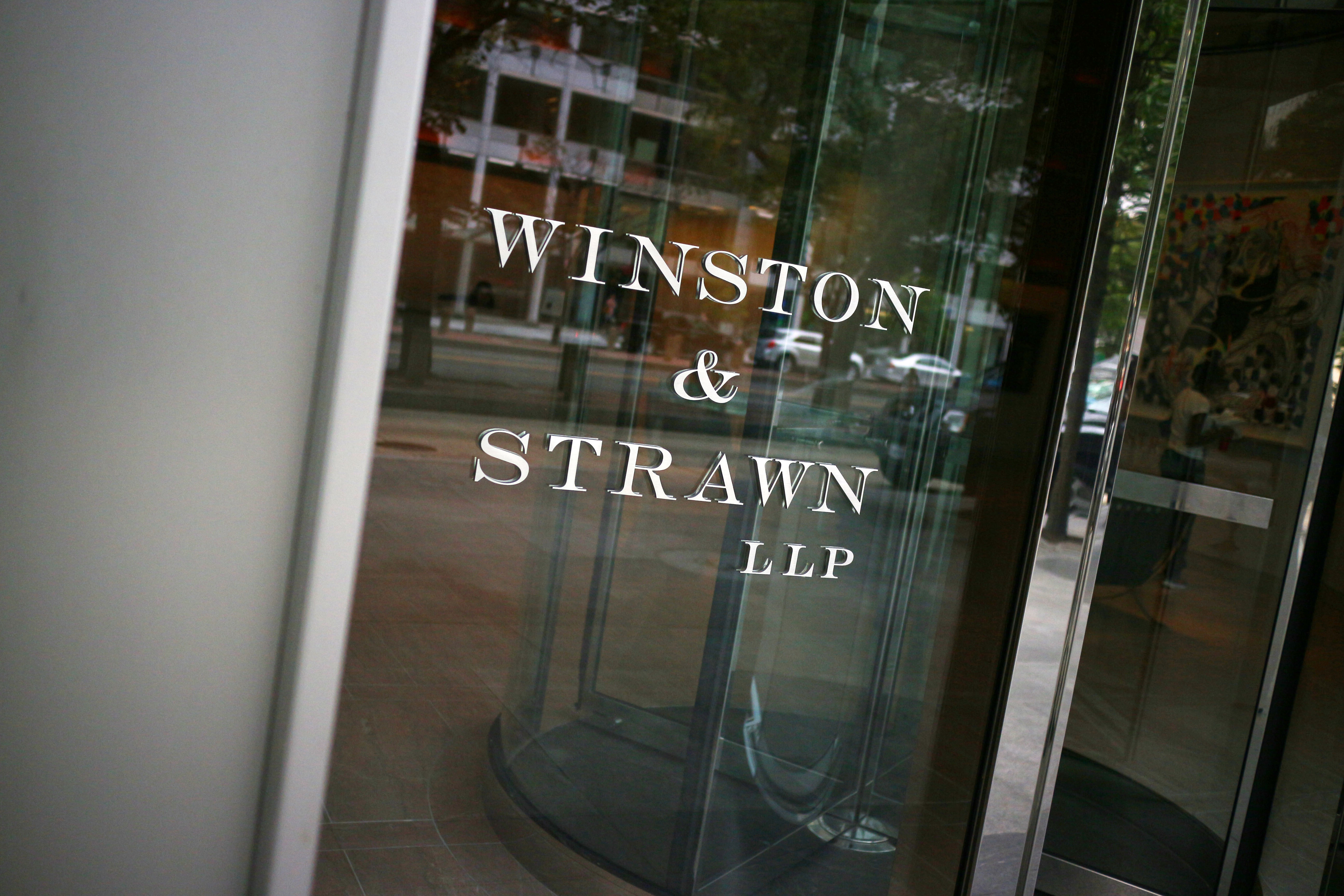 Winston & Strawn’s Washington, D.C. offices on K Street, NW.
Winston & Strawn’s Washington, D.C. offices on K Street, NW.
When is a non-equity partner really just an employee?
That’s the question pending before a California appellate court in what IP litigator Constance Ramos, who is suing Winston & Strawn for sex discrimination, says is an issue of first impression in the state.
The answer could determine whether her suit goes to arbitration—where it will be decided by a panel of neutrals who are all partners at 500-plus lawyer firms, good luck with that—or to a jury.
My colleague Xiumei Dong offers the latest look at the case, which at its core is the tale of a lateral move gone bad.
The details are irresistible.
Ramos joined Winston’s San Francisco office from Hogan Lovells in 2014, part of a three-partner group led by rainmaker Korula “Sunny” Cherian. Her base salary as an “income partner” was $450,000—more than an eighth year associate to be sure, but far less than the $1.425 million that Winston’s equity partners took home that year.
Based on Ramos’ complaint filed last summer in San Francisco Superior Court, it’s clear that Cherian, who was co-head of Hogan’s IP practice in the U.S., was the big draw. But he left Winston after just 18 months to form IP boutique RuyakCherian with colleague Bob Ruyak. (You might remember Ruyak as the chairman of now-defunct Howrey, where Cherian and Ramos also once worked.)
Cherian didn’t take Ramos with him when he left. And not long afterwards, Winston asked her to withdraw from the firm.
Ouch.
As described in the complaint, it’s hard to tell what actions could have been discrimination based on gender, as opposed to what any lawyer—male or female—might face if the big-shot partner who brought you in abandoned you, you didn’t have much business of your own, and your client balked at paying your bills.
The third partner Ramos lateraled in with, Robert Scott Wales, doesn’t appear to have thrived at Winston either. He left the firm even before Cherian did, and California bar records don’t list a new employer.
From the beginning, Ramos said Winston showed little interest in her. She alleged that Cherian and Wales were provided with “assistance to acclimate to the firm, develop connections and maximize business opportunities,” but she was not. Nor did she get a “dedicated partner liaison who serves as a go-to resource,” as promised in the firm’s “lateral partner integration program” materials, she said.
“When petitioner came to work at Winston she had a well-established career as an intellectual property attorney. She expected to be treated as her own person, assessed on her own performance, offered equal support, and compensated based on her own achievements. Instead, Winston treated her as the appendage to a senior male capital partner, with her career trajectory tied to his personal career choices,” wrote Ramos’ lawyer, Noah Lebowitz of Duckworth Peters Lebowitz Olivier, in court papers filed Friday.
But at this point, the merits of her claim aren’t the issue. The fight is over the forum.
Winston is represented by a team from Orrick, Herrington & Sutcliffe including star litigator Lynne Hermle. In October, the Orrick team filed a motion to compel arbitration, pointing out that Ramos is “a sophisticated lawyer with decades of legal experience,” and that she signed a partnership agreement containing an arbitration clause.
“She cannot in good faith argue that she did not knowingly agree to be bound by the partnership agreement,” Orrick partner Jessica Perry wrote for Winston. “All of plaintiff’s claims … fall squarely within the scope of the partnership agreement’s arbitration provision.”
In November, Judge John Stewart in San Francisco agreed, and ordered the case to arbitration.
Now, Ramos is challenging that decision on appeal, arguing that she wasn’t a partner in the real sense of the word, and should not be bound by the agreement’s arbitration provision.
“The facts show that title of ‘Income Partner’ at Winston does not carry with it the status of actual ‘owner’ or ‘employer.’” Lebowitz wrote. “Here, petitioner owned 0 percent of the firm’s shares, had very limited and diluted voting rights, did not share in the firm’s profits, and was compensated based on a set annual salary. … Instead, an Income Partner like petitioner is more properly characterized as an employee entitled to California’s workplace protections.”
Gibson Dunn’s Big Squeeze
 Tropicana orange juice
Tropicana orange juice
Gibson, Dunn & Crutcher’s Daniel Nelson on Monday delivered a major win for PepsiCo’s Tropicana, knocking out a would-be class action by consumers who said the orange juice was falsely marketed as “pure, natural and fresh from the grove.”
Senior U.S. District Judge William Martini refused to certify the class, which would likely have included hundreds of thousands, if not millions of members.
The plaintiffs, who were represented by lead counsel James Cecchi of Carella, Byrne, Cecchi, Olstein, Brody & Agnello alleged that Tropicana added “natural flavoring” in violation of the Food and Drug Administration’s standard of identity for pasteurized orange juice; failed to disclose all ingredients as required by law and misleadingly marketed the juice as pure and natural.
But Martini in refusing to certify the class found that “common questions do not predominate over individualized concerns.”
Drawing on deposition concessions that Gibson Dunn obtained from the named plaintiffs, Martini noted that the consumers bought the juice for “various reasons,” like its vitamin content, taste and price. Only one of them mentioned its pasteurized quality, he noted.
“Plaintiffs’ common law and New Jersey consumer fraud claims are plainly unsuitable for class certification because each of these claims requires individualized proof,” Martini found.
More Legal News
DOJ Says Menendez Defense Counsel Used Race, Politics as Jury Nullification Tactics
Prosecutors also took issue with Menendez’s periodic prayer circles with clergy during the trial and his singing of hymns such as “Amazing Grace” in hallways and elevators at the courthouse.
Lawsuits Claim State Dept. Illegally Discriminates Against Same-Sex Couples’ Children
The State Department denied citizenship to the children because they did not have a biological connection to the parent with U.S. citizenship, the lawsuits allege.
California Judge Blisters CFPB, Rejects $235M Restitution Request
In a win for Skadden and Latham lawyers, U.S. District Judge John F. Walter ruled the CFPB failed to show that any restitution was appropriate.
SEC Says Former KPMG Employees Used Leaked Inspection Info to Dodge Audit Review Problems
SEC Chairman Jay Clayton called the alleged conduct disturbing, going to the heart of the commission’s disclosure-based regulatory regime.
Where’s the Damages? Proposed LIBOR Class Settlements Leave One Objector Wondering
When Arent Fox partner Les Jacobowitz was alerted by a client to the $120 million class settlement in 2017, he was stunned. “I said, holy smokes.”
Some Federal Workers Are Still Fighting to Get Paid From the Last Shutdown
“These are people that keep us safe. If they are so important, even in a shutdown, they should not have to wonder if they will be paid.”
Cooley Saves Patents on Night Vision Goggles From US Challenge
The technology can be used “in a myriad of settings” ranging from law enforcement to surgery to astronomy.


